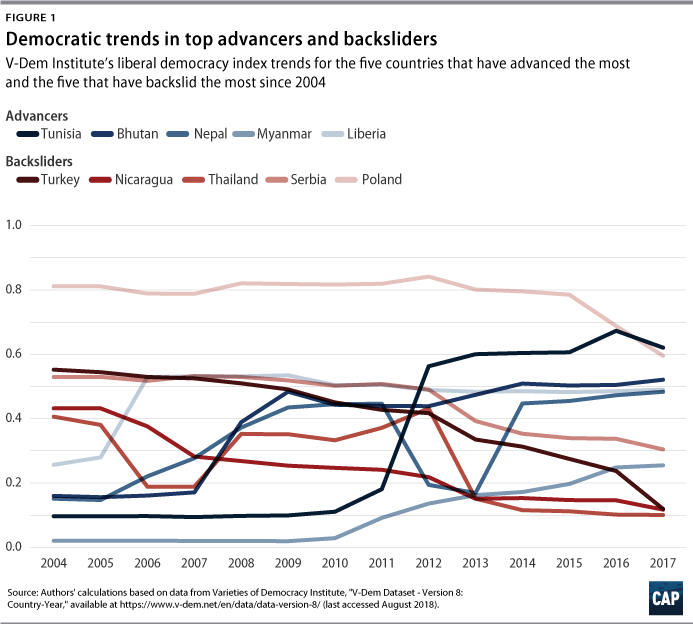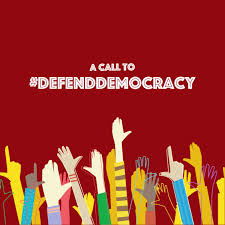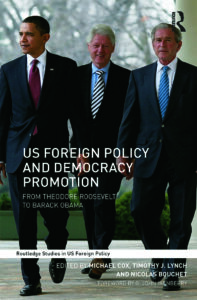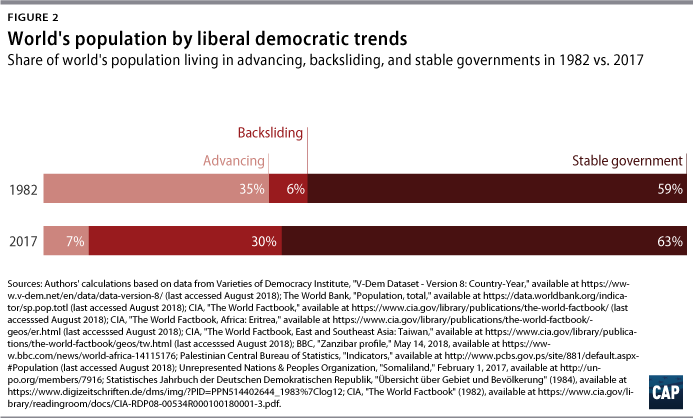
With democracy backsliding and authoritarian countries flexing their muscles, the United States should accelerate efforts to help established democracies succeed and assist states undergoing democratic transitions, says a new analysis.
A multiyear, multibillion-dollar Democratic Strategic Advantage Initiative would help established democracies and emerging democratic states by revamping foreign assistance, addressing the anomaly through which “the bulk of America’s foreign assistance goes to nondemocratic countries,” a Center for American Progress plan says, adding that the U.S. is “privileging its nondemocratic partners over its democratic allies.”
Over the years, the U.S. government has accrued more and more tools aimed at strengthening democracies abroad, but those tools remain largely uncoordinated, according to CAP analysts Michael Fuchs and Alexandra Schmitt:
 Multiple U.S. agencies and offices coordinate a wide range of programs that aim to provide support for free and fair elections, to reform judiciary systems and law enforcement entities to uphold justice more fully, and to train municipal officials on rule of law and human rights. But these tools are spread across several entities, including USAID, the State Department, the National Endowment for Democracy, and bilateral and multilateral efforts.
Multiple U.S. agencies and offices coordinate a wide range of programs that aim to provide support for free and fair elections, to reform judiciary systems and law enforcement entities to uphold justice more fully, and to train municipal officials on rule of law and human rights. But these tools are spread across several entities, including USAID, the State Department, the National Endowment for Democracy, and bilateral and multilateral efforts.
Security assistance is split between the State and Defense departments through dozens of individual programs. Furthermore, the United States has numerous foreign policy tools that at present it does not use effectively to support democracy. From economic and development assistance to trade preferences to security partnerships, the U.S. foreign policy toolkit is filled with methods of strengthening relationships with other countries. Yet many of these tools are not offered to democratic countries.
 Consequently, two major initiatives would help support democracy around the world, they contend:
Consequently, two major initiatives would help support democracy around the world, they contend:
First, the United States should organize a summit of the world’s leading democratic nations in order to develop a plan that encourages all democracies to help one another and work together on shared global challenges.
Second, the next administration should present to Congress a plan for a new multiyear, multibillion-dollar Democratic Strategic Advantage Initiative to help established democracies and emerging democratic states.
“Both of these initiatives would help the world’s democracies counter today’s competing authoritarian models of governance, which China and Russia have increasingly pushed on the geopolitical stage,” said Fuchs, a senior fellow at CAP. “They would pay dividends for Americans by creating better partnerships with democratic states, driving economic growth and trade opportunities, and fostering stability and security around the world.”
 The democracy summit would convene a group comprised of the G-7 countries as well as Australia and South Korea; it would also consider adding countries such as Brazil, India, and South Africa to this expanded G-7, with the aim of achieving two goals:
The democracy summit would convene a group comprised of the G-7 countries as well as Australia and South Korea; it would also consider adding countries such as Brazil, India, and South Africa to this expanded G-7, with the aim of achieving two goals:
(1) secure specific, immediate steps that democracies can take to protect democracy around the world; and
(2) establish an ongoing agenda and mechanism for democracies to cooperate on global challenges.
The Democratic Strategic Advantage Initiative – akin to large-scale U.S. foreign assistance efforts such as the global fight against AIDS or Plan Colombia – would give democracies a strategic advantage over authoritarian competitors through a focus on three goals, the paper adds:
(1) make clear that the United States intends to use all of its tools to support democracy abroad;
(2) direct the U.S. government to work with partner countries on action plans to specifically outline how the United States can support democracy in each country; and
(3) dedicate funds that help advance U.S. policies to bolster democratic countries. RTWT








